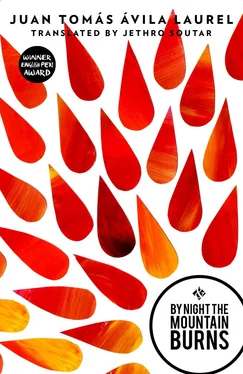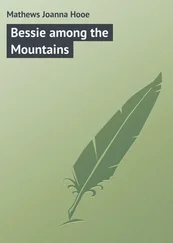Juan Ávila Laurel - By Night the Mountain Burns
Здесь есть возможность читать онлайн «Juan Ávila Laurel - By Night the Mountain Burns» весь текст электронной книги совершенно бесплатно (целиком полную версию без сокращений). В некоторых случаях можно слушать аудио, скачать через торрент в формате fb2 и присутствует краткое содержание. Год выпуска: 2014, Издательство: And Other Stories Publishing, Жанр: Современная проза, на английском языке. Описание произведения, (предисловие) а так же отзывы посетителей доступны на портале библиотеки ЛибКат.
- Название:By Night the Mountain Burns
- Автор:
- Издательство:And Other Stories Publishing
- Жанр:
- Год:2014
- ISBN:нет данных
- Рейтинг книги:5 / 5. Голосов: 1
-
Избранное:Добавить в избранное
- Отзывы:
-
Ваша оценка:
- 100
- 1
- 2
- 3
- 4
- 5
By Night the Mountain Burns: краткое содержание, описание и аннотация
Предлагаем к чтению аннотацию, описание, краткое содержание или предисловие (зависит от того, что написал сам автор книги «By Night the Mountain Burns»). Если вы не нашли необходимую информацию о книге — напишите в комментариях, мы постараемся отыскать её.
By Night the Mountain Burns — читать онлайн бесплатно полную книгу (весь текст) целиком
Ниже представлен текст книги, разбитый по страницам. Система сохранения места последней прочитанной страницы, позволяет с удобством читать онлайн бесплатно книгу «By Night the Mountain Burns», без необходимости каждый раз заново искать на чём Вы остановились. Поставьте закладку, и сможете в любой момент перейти на страницу, на которой закончили чтение.
Интервал:
Закладка:
And how do you think we were left when grandmother’s niece didn’t send us even a solitary fish’s head, which was all she did send some days? We were left holding a hunk of cassava bread and thinking of salt. I’ve already said how dry the bread was and that it was difficult to swallow on its own. Indeed it was painful to swallow if it wasn’t softened by the water the fish had been boiled in, water we liked to call sauce. I think I already mentioned it. You dipped your bread in the water, the leftover water from grandmother’s cooking, and that way it went down your throat painlessly and with some sense of taste. So when not even a fish’s head reached our house, the more sensitive among us ate nothing and, after biding time beside the kerosene lamp, we went to bed on empty stomachs, feeling terribly sorry for ourselves. That lamp was the only source of light in the house. Gracias a Dios , it didn’t end up with grandfather upstairs, though maybe he had his own. Anyway, the more enterprising among us held that piece of bread in our hands and thought of salt and chillies. We carried the lamp, or whatever light was available, and groped around outside looking for chillies, tiny chillies that were red when ripe, green otherwise. Then we went back into the house and crushed them up with a bit of salt. As we did so, grandmother and our mothers would warn us about the heat, though sometimes they just left us to it. Emergency preparations made, the next step was to dip your piece of bread into the chilli and salt mix, then stuff it in your mouth. It was our substitute for fish, the fish our grandfather had failed to bring us by shutting himself away at home. You had to blow on your lips as you chewed, to counter the intense heat and burning. For the thing is, the chillies on our Atlantic Ocean island may be small, but boy are they potent. You chewed and wham! You blew on your lips and tears came to your eyes, for chillies seem to demand a lot of water. In fact, you blew on your lips only because you couldn’t eat and drink at the same time, but as soon as you’d chewed and swallowed, you tipped a whole glass of water down your throat. You finished and then it was bedtime, and ouch for any boy who forgot to wash his hands before putting them in his trousers and taking hold of his organ to pee! And ouch for any girl who carelessly let her unwashed hand touch her slit! Ouch! Ouuuch! I already said how hot the chillies are on our island. And if it was hard enough to get over the heat on your lips, it was harder still to get over a heat that burned inside you, and in such a sensitive area, and all because of a man whom we knew nothing about, our grandfather.
I don’t want to say any more about the lack of fish and other animals to eat without mentioning that I knew the island priest because we used to take eggs to him. So surely we could have eaten eggs with the cassava bread! Why did they not cook eggs for us? Grandmother would send us to take eggs to the Padre , and we were glad to be sent on such an important assignment. The Padre lived at the Misión , just above the church, or behind it, in the upstairs of a building joined on to the Misión . Someone worked for him and it was this person who opened the door and took the eggs from us. Sometimes we could see the priest whiling away time on the balcony, staring out to sea. From the Misión you could see the sea, and also our house. And you could see someone sitting on our balcony, which had to be grandfather. Sometimes we thought our grandmother sent us there just to see grandfather and the house from a different angle. The Padre did the opposite to grandfather and stared at the sea, in case a boat passed the island. Grandfather stared at the mountain, every day, and never tired of looking at it, as if he knew that whatever it was he was waiting for would come from up there. Perhaps he was waiting for the king of the mountain, or of the lake, which was, and still is, on the other side of the mountain.
As our bodies grew, so too our curiosity, and one day we got the idea of going into grandfather’s sleeping room. He slept alone, or at least I thought he slept alone, though I never knew if grandmother slept with him. I didn’t know if his room was really their room, because grandmother always went to bed after everyone else, so I never knew where she slept. But anyway, we wanted to know what was inside grandfather’s sleeping room. Although first I should probably explain where we all slept. Our mothers slept with their littlest children and their daughters, even if those daughters were not little but the same age as us, the boys. So it might be that in one bed slept one of my aunts, a child of between two and six, sometimes older, and a girl about the same age as me. They arranged themselves like this: first the mother, then the child in the middle, and the girl by the wall. If there was another little child, a little girl or a boy who wasn’t yet as old as we were, he or she slept at the feet of the other three, and nobody complained, and two of them would wet the bed, even if they’d been made to go outside and pee at the door before bedtime. In another bed there might be the same arrangement, assuming the next aunt had the same number of children, by a father who was in another town, somewhere you got to by boat.
All the boys who were a bit more grown-up, of whom there were three in grandmother’s house, slept in the same bed, a bed that had evidently been of good quality once upon a time. I was the youngest of the three, so I slept in the middle. All three of us peed in our sleep, that’s to say, we all wet the bed. Which is why it ended up ruined. When I started sleeping in it, the base had already begun to rot because of the ferocity of my older brothers’ peeing. Wetting the bed was something we just couldn’t help and if I were to start telling all the stories born of our torrential peeing, we’d be here for several days. Let’s just say that between the three of us we got through that good mattress, which had been a white man’s mattress, the grass mattress they gave us afterwards, the bed base, the board they put under the mattress when we first made a hole in it, and so on, until there was nothing left for us to get through. And the cloth we covered ourselves with was turned to rags. Of course the adults sought cures; someone said we’d stop wetting the bed if we ate crab droppings. I ate them, my bedfellows ate them, and still the unstoppable river flowed. Such was life when we decided to explore grandfather’s room.
Our chance came when a man we understood to be grandfather’s friend came to visit him. He was a man the adults in the house said had only just come to the island, that he’d arrived on the last boat, although we had the impression we already knew him, or had at least seen him around the big village. Maybe we confused him for someone who looked like him, or we never associated him with the arrival of a boat, and therefore we never knew that previously he hadn’t lived on the island. Whatever it was, we were told he’d arrived on the last boat and, as he was a good friend of grandfather’s, he came over to see him. He waved to grandfather up on the balcony and grandfather went downstairs and out to meet him. We watched them walk away together, towards the north of the village, and it was said that grandfather talked to him and that they talked about things only they knew about. It was even said that from time to time during the conversation my grandfather shook his head and cried out in exclamation, as if incredulous or surprised, as if one of them had said to the other that only in Africa could such things happen. In any case, it was said they talked in low voices, as if exchanging confidences or secrets. We didn’t see any of this, but it made sense that if grandfather had gone out with the man, he must have said something to him. Grandfather knew how to speak after all! So why did he never talk to us at home? Anyway, we saw them walk away towards the cemetery. Now that I think about it, somebody had died that day and there’d been a funeral procession.
Читать дальшеИнтервал:
Закладка:
Похожие книги на «By Night the Mountain Burns»
Представляем Вашему вниманию похожие книги на «By Night the Mountain Burns» списком для выбора. Мы отобрали схожую по названию и смыслу литературу в надежде предоставить читателям больше вариантов отыскать новые, интересные, ещё непрочитанные произведения.
Обсуждение, отзывы о книге «By Night the Mountain Burns» и просто собственные мнения читателей. Оставьте ваши комментарии, напишите, что Вы думаете о произведении, его смысле или главных героях. Укажите что конкретно понравилось, а что нет, и почему Вы так считаете.












